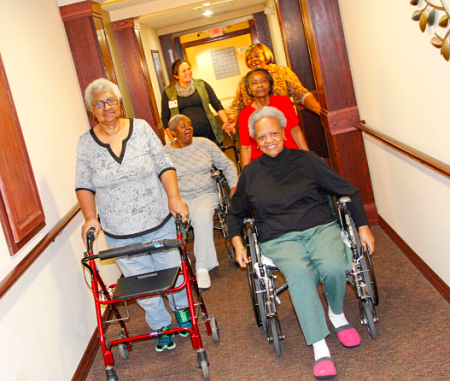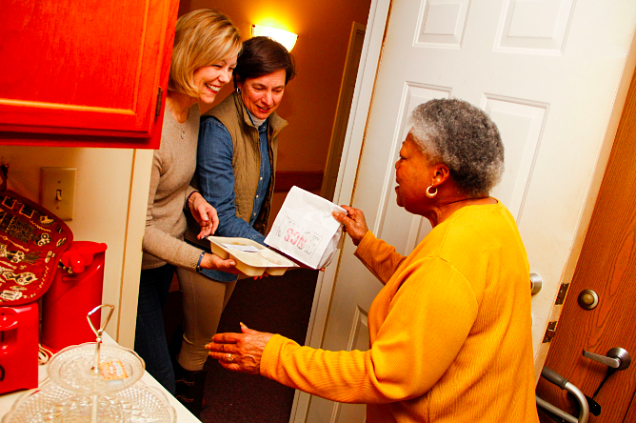What do you need to do to become qualified for a career in senior care?
What courses do you need to take? Do you need to be a licensed health care provider, or are there non-clinical roles that you could function in?
We get questions like this all the time.
The fact is, there are a wide variety of jobs that fall under the aegis of “elder care.” And, no, not all of them are roles that must be filled by clinicians.
Today, we thought we’d give you some insights into the various opportunities available to you with a senior care system like Episcopal Retirement Services (ERS), and discuss what you would need to study or accomplish in order to apply.
Do you have the drive and determination to go for your M.D.?
On the clinical side of senior care, there’s no question that there‘s a critical need in the United States for new doctors — especially, as our population ages, geriatricians and primary care physicians.
The great news, if you’re planning to go to medical school, is that you can really major in just about anything. That’s provided you knock out your core science requirements like biology, general chemistry, organic chemistry, physics and calculus, and do well on the MCAT.
Many medical programs, in fact, now give a little bit more preference to humanities majors. That’s because most medical school applicants today are STEM majors, and many programs view humanities majors as more empathetic and well-rounded than their math-and-science peers.
If four years of medical school, four years of residency, two years of fellowship training and one giant student loan bill aren’t appealing to you, though, fear not: the senior care industry needs nurses and support clinicians, too.
Nursing and licensed therapist programs (physical therapy, occupational therapy, respiratory therapy, speech pathology, etc.) are fairly cut-and-dried, in terms of their course requirements. And any accredited, reputable program will prepare you well, from the standpoint of medical competence.
But effective senior care clinicians need more than just the sciences.
It might be helpful to augment your scientific and clinical courses with courses that would help you better understand your future patients’ mindsets. Psychology and sociology courses — especially seminars that focus on aging and issues related to aging — could be immensely helpful.
So, too, could courses that explore the human condition: literature, history, art and philosophy, for example. That might seem a bit counterintuitive, because you’re not likely to find such courses specifically focusing on the elderly, but they could help you develop your own emotional intelligence, which will certainly help you in your work.
They’ll also help you to develop your reasoning and analytical skills, which will make you more observant. It’s critically important to be able to pick up on minute changes in your senior patients’ day-to-day health or behavior.
And you might mix in courses in social work, for example: you’ll find it helpful to understand how to connect your senior patients or their family members with community-based resources. In practice, the lines between clinicians and social workers often get blurred.
You don’t need a Master’s degree, but . . .
It should be noted that Master’s degrees are becoming increasingly common among nurses and therapists, so to keep pace with other applicants in the field, you might want to apply to programs that offer accelerated post-graduate degree.
To truly stand out, though, you’ll need to be able to demonstrate a passion for delivering person-centered, dignified care. And, again, this is where humanities courses could really help you.
Most older patients are, for their part, incredibly grateful and rewarding to work with. But many of them — especially in residential elder care or residential memory care — are frail and highly vulnerable. The best senior care providers exhibit watchful vigilance, steady patience and generous empathy.
Senior care is more than just health care.
ERS is a retirement community provider. And, like any community, it takes many different individuals with many different skills to make the world go ‘round.
If you’re a business major, you might work in marketing or finance for a senior care system. You’d specifically want to know what seniors’ health care needs and lifestyle preferences are like, so again it might be helpful to augment your normal business courses with psychology and other humanities courses.
Health care administration majors who are looking toward a career in senior care might want to pair their normal courses with a project management certification, such as Six Sigma, or with courses in finance or accounting. You might also want to develop your comfort and familiarity with peer-reviewed medical and business literature, so that you can stay ahead of medical tech and health business trends.
The senior care industry is growing and we, like many other retirement care providers around the nation, are building out more resident capacity — if you want to aim for a leadership role with a retirement care provider, it would be helpful to understand the ins and outs of commercial development.
If you’d like to work in a hands-on, but non-clinical capacity, there’s a great need for patient care assistants (for which you’d need a certification in some states).
And there are many, many roles in elder care that require nothing more than a high school diploma or vocational training: cooks and dining service attendants, maintenance workers and groundskeepers, Meals On Wheels and shuttle van drivers, unit secretaries, and more.
Interested in a career at ERS? Check out our current openings. We’re always looking for people who are passionate about delivering person-centered, dignified care.















